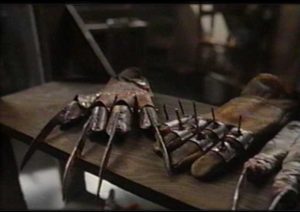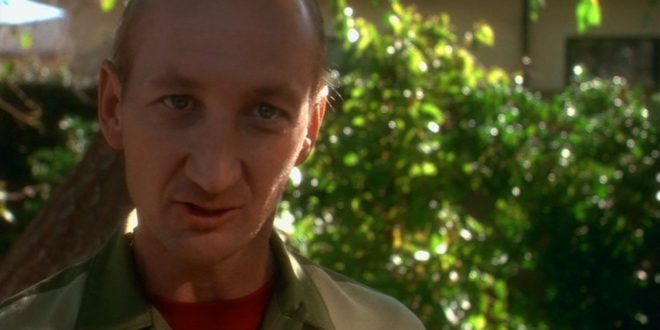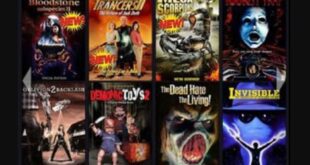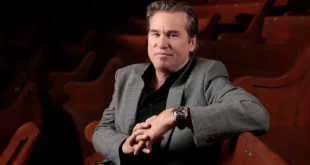Though it’s frequently maligned by both fans and critics, Rachel Talalay’s Freddy’s Dead: The Final Nightmare nonetheless has its supporters. Personally, it’s one of my favorites of the series, and it’s not just due to bad taste on my part (or so I’d like to believe). For one thing, Freddy’s Dead elaborates on a lot more on the Freddy Krueger (Robert Englund) story.
Read parts one, two, three, four and five of how Freddy’s evil evolved.
While we knew he was a twisted freak, Freddy’s Dead delves even deeper into Freddy’s actual backstory to show that, yes, it was rather messed up. As many suspected, Freddy’s life was all but designed to make him into a monster. While not everyone with a troubled past becomes a serial child-murdering dream demon, we’re talking Freddy here, people! Also, you have to love the Nietzsche quote at the beginning: “Do you know the terror of he who falls asleep? To the very toes he is terrified, because the ground gives way under him, And the dream begins… ” Bad-ass!
Piecing Together Krueger’s Backstory

Before we look at Freddy’s supernatural powers as depicted in the film, let’s examine the Freddy Krueger backstory itself. Spoiler alert: Freddy had a wife and kid. This is actually not unusual for serial killers, and neither is an abusive childhood. When Maggie Burroughs (Lisa Zane: Bad Influence 1990) enters Freddy’s memories later into the film, we catch glimpses of both truths. Frankly, these are some of the most chilling scenes from the entire series. First, we see a young Freddy (Chason Schirmer) smashing a rodent with a hammer in class, as classmates and adults jeer that he’s the “son a hundred maniacs.” While this may be a composite memory or Freddy’s impression of events, it suggests that people were aware of the twisted circumstances of birth and mocked him regularly (if not relentlessly) for it.
Could that be traumatic, especially if it’s near-constant? Yes, it could. It doesn’t end there, though. We also see Freddy Krueger as a teenager (Tobe Sexton: Art Of Submission 2012), cutting himself with a razor and liking it very much. Then he receives a belt-whipping from his stepdad (rock legend Alice Cooper), inspiring the rebellious Krueger to show him the secret of pain. What is that? “If you just stop feeling it, you can start using it.” This provides some insight into the Freddy Krueger mentality. He’s seen as dominated by pain and cruelty, in addition to the blatant sadistic impulses he generally has. If you look over the entire series, there’s scarcely a moment where his own thinking isn’t dominated by inflicting violence. Unfortunately, this sort of mentality is present in many actual serial killers. It just so happens that, in this fictional universe, Freddy’s evil is basically paramount.
When we see him kill his wife, Loretta (Lindsey Fields: In My Daughter’s Name 1992), it seems to be Freddy at his most unhinged. In fact, there’s reason to assume Loretta’s murder was a big part of what got Freddy under suspicion. The story doesn’t provide much detail about whether he hid her body, but it does seem that his daughter, young Maggie (Cassandra Rachel Friel: Lassie TV series), later “told on him,” thereby getting him into trouble. Still, would there have been any strong physical evidence of this particular murder, or was Freddy clever enough to cover up his devious tracks? That in itself is an interesting question, albeit speculative. Plus, let’s face it: This movie is unpopular enough that some wouldn’t bother treating it as canon.
Freddy Krueger Powers (and Limits)

‘
While Freddy is powerful, Freddy’s Dead: The Final Nightmare also explores some of his weaknesses. For one thing, he seems dependent upon his daughter, Maggie/Katherine, to attack a fresh crop of troubled teens outside of Springwood. At one point he explains, “You’re my blood. Only you could’ve brought me out — in your mind.” This continues the common theory that, in order to kill, Freddy requires a psycho-spiritual connection to his victims. Freddy’s Dead expands upon this, demonstrating that his power is not strictly about geographical location. Of course, this movie also introduces the concept of dream demons, who ultimately link up with Freddy upon his death (or near-death). They help him transform into the pop culture menace we know and love today, while complicating his story in an interesting way.
Doc (Yaphet Kotto: Alien 1979) explains the ancient dream demons to him, saying, “Supposedly, they roam the dreams of the living until they find the most evil, twisted human imaginable. Then, they give him the power to cross the line and turn our nightmares into reality.” In Freddy’s Dead, Fred actually erases John Doe (Shon Greenblatt: Newsies 1992), Carlos (Ricky Dean Logan: Back To The Future Part II 1989), and Spencer (Breckin Meyer: Clueless 1995) from memory. He’s also turned his old stomping ground of Springwood into a sad, delusional mess, rendering the remaining, elderly residents into shells of their former selves. This helps emphasize Freddy’s revenge motive, in addition to the sadistic impulses we’re so familiar with. However, it’s not Freddy’s power alone at work, but his spiritual marriage to those wacky, puppet-like demons. Still, it would be interesting to learn of other dream demons similar to Freddy Krueger that share the same universe. Could that become a plot in the franchise’s possible future?
Anyway, Freddy’s Dead is often criticized for its over-the-top, humorous kills. For example, his reference to the Power Glove is sometimes (in my opinion, falsely) called “out of touch.” I will make a light defense of this film’s aspects by simply saying: Why wouldn’t Freddy be like this? Given that he’s a full-fledged maniac, why wouldn’t he kill Spencer in a video game-like manner? Also, for those who say the video game sequence featured bad graphics even for the time, I say, “No, not really.” By 1991, NES-style graphics weren’t entirely on the wane. Plus, maybe that was Spencer’s gaming preference?
In any case, we know Freddy invaded Spencer’s brain to find something he connected with, then exploited it in some very strange ways. In the past, Freddy did enjoy playing with his food (so to speak). Spencer had a neglectful father, Tracy (Lezlie Deane: Midnight Ride 1990), and Carlos had abusive ones. Freddy tapped into those psychological weaknesses and exploited the hell out of them. Maybe these scenes aren’t conveyed in a scary enough manner, but they do fit Freddy’s M.O.
Does Freddy Refrain From Killing Maggie?
I’ve written enough about Freddy’s Dead, but there’s one nagging question: Does Freddy hold back on killing his daughter? I’m going out on a limb here, but there are signs. Yes, he does say, “I didn’t need a glove to kill your bitch of a mother, and I don’t need one now!” then grabs her by the throat. However, Freddy seems more interested in actually wresting the glove back from her. This theory is also partly supported by the fact that, when Freddy first encounters her face-to-face, he totally relents from trying to kill her. How many other times has Freddy Krueger shown such… respect? While this is a somewhat loose-fitting premise, there is something to it. Also, going back to real-life examples, you will find interviews with actual serial killers who say certain people were off-limits.
That being said, there was a similar dynamic between Freddy and Alice (Lisa Wilcox: A Nightmare On Elm Street: Dream Master 1988), whom the maniac didn’t exactly kill at every opportunity. So, it’s possible that Freddy was simply being strategic due to his need to link to them. However, let’s not forget that Freddy also complimented his daughter’s childhood art, which he certainly didn’t have to do. This is the closest he ever came to being a nice, normal person. That’s saying something!
What are your thoughts on Freddy’s Dead: The Final Nightmare? Let us know in the comments!
 PopHorror Let's Get Scared
PopHorror Let's Get Scared




